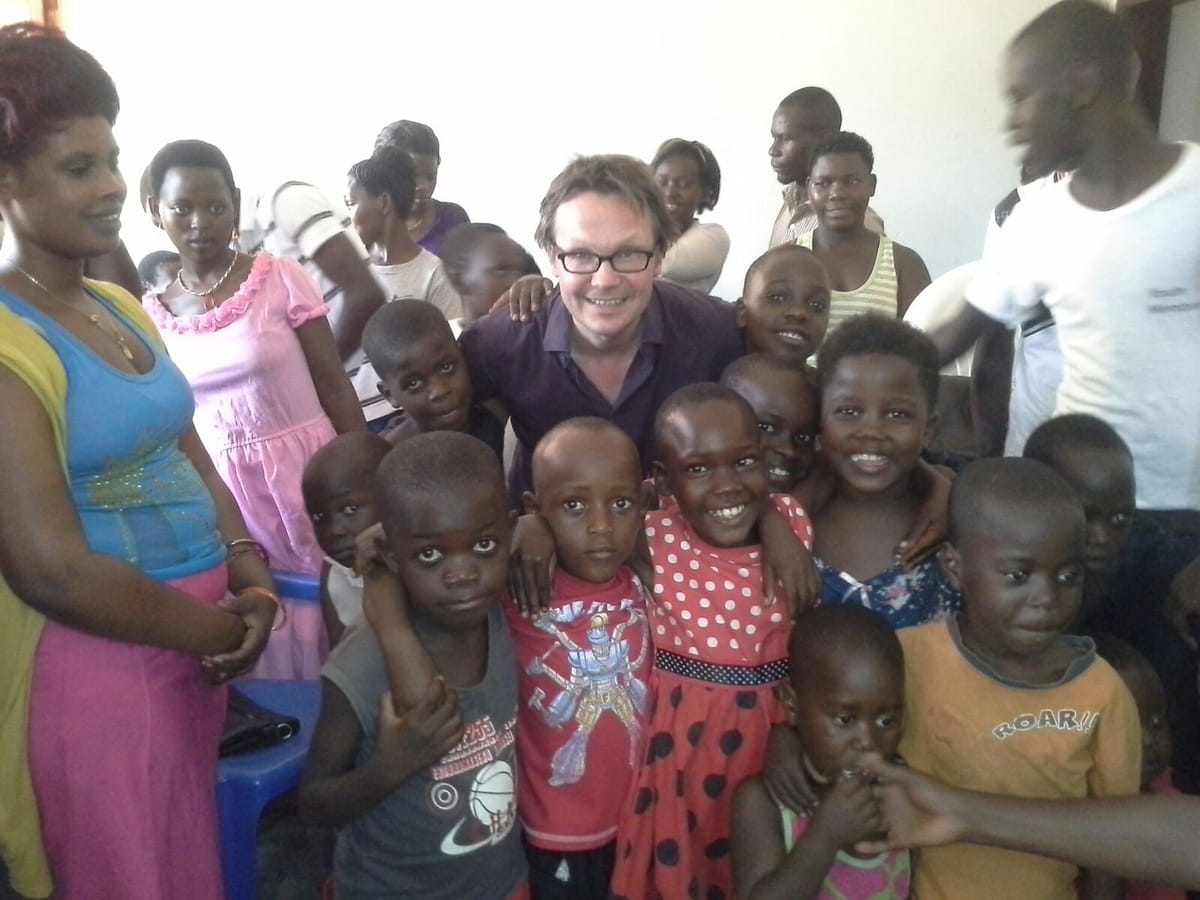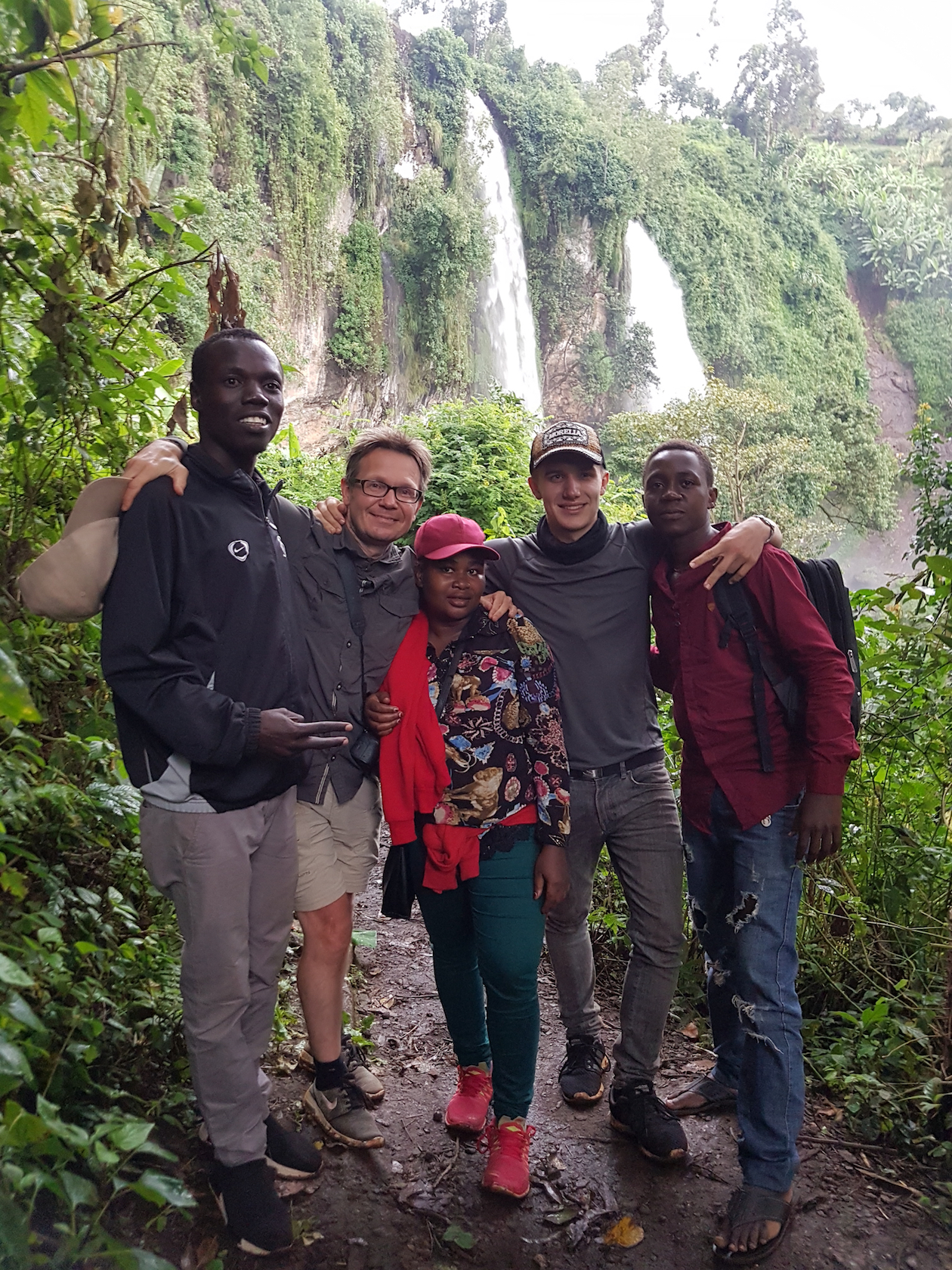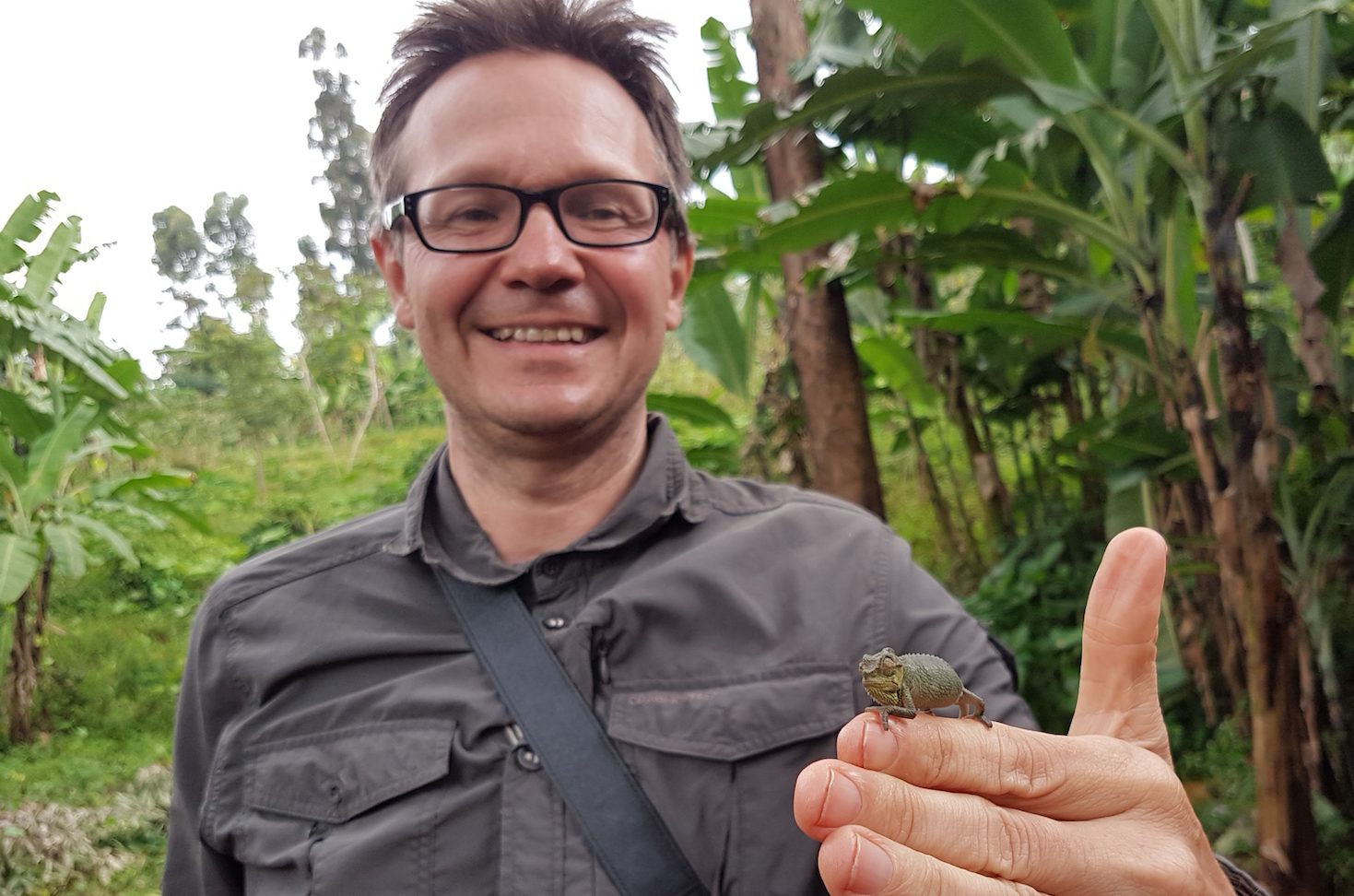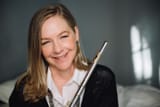Discover Sören Sieg with Syrinx : XXII

Katharine Rawdon: Sören Sieg, the first time I heard your music I nearly fell off my chair with delight! It made me tap my foot, smile, and want to get up and dance (and I’m no dancer!). So in this interview I would love for you to answer for the readers of Serenade some burning questions I had at that moment, starting with: WHO IS SÖREN SIEG???
Sören Sieg: Hahaha, thank you so much for all these compliments! Well, in one word, I am a Danish-German composer living in Hamburg, northern Germany, obsessed with African music and the African mentality, happily traveling around the world with his music!
KR: Ah, so now I see that Sören is a Danish name, great! So, can you start by telling us how you got interested in music?
SS: Well, I can’t really answer how I got interested in music – because I can’t remember a time where I was not! I had the huge luck to be born into a musician’s family. My grandfather studied music at the famous Folkwang Music School in Essen, he earned the money for his studies as a jazz saxophone player in cafés and later taught violin, recorder, guitar, piano and conducted his own chamber orchestra. He was such a vibrant personality, he kept teaching till he was 88, and at his 90th birthday he still played string quartets with his friends! I studied the violin with him from age 5 to 12. My mother was a recorder teacher, and one of my earliest memories is playing recorder quartet with my mum and my two older siblings. But my greatest love has always been composing. Long before receiving piano lessons I sat down at our family piano and made up my own little melodies. I still remember the first one I wrote when I was six. At age nine I discovered the Beatles, and I think I learned all their songs by heart. Besides learning violin, recorder and piano I later also learned guitar, trumpet, saxophone, drums and percussion. But the irony of it all: after learning seven instruments and studying piano at the music university, I became a singer for 18 years.

KR: What? All those instruments were left on the shelf and you began singing? How is that?
SS: Well I was meant to become a music teacher at what we call Gymmnasium (something like high school). But during my studies I founded an a cappella singing group with three other students that became a huge success. From 1999 on we gave 140 concerts every year – so I quit everything else I had been doing, including piano teaching and choir conducting, and never became a music teacher.
KR: That sounds like life, don’t you think! What were you singing? Barbershop? (I’m joking…)
SS: (laughing) Hell, no! It was a quite unique mix between a cappella music, theatre and comedy, and I wrote the programmes, which included musical styles from classic to jazz, from Pop to African music. That’s what is so fascinating about a cappella: first, the purity of the harmonies, and second: you can perform any kind of music with fours voices! The flexibility is enormous. But finally I got tired of touring and quit the group in 2012. But I still write their programmes – the 15th has just been premiered in Hamburg.

KR: And at some point you turned to writing novels—that’s quite a surprise!
SS: Well, that’s the other side of the family: my father was an author, and the most productive person I ever met. So I have always been writing, too. In total I wrote sixteen books of which eleven were published and two became bestsellers. And besides that I wrote a page-one-column for a big German newspaper for several years.
KR: Wow! That is just amazing? What were the books about?
SS: Well, basically about my family, my three kids. They were (and are!) incredibly lively and bubbly, like some people say I am. So I did not have to invent much. Only now they have already grown up, they are 18, 20 and 25.
KR: Oh, I am once again sorry to not read German well; are your books translated into English?
SS: I am afraid not! While 80% of German bestsellers are translations, the Anglo-American book market is rather closed! So this career was limited to Germany, Switzerland and Austria.
KR: Do you then find that your literary work and your music composition are very connected, somewhat connected, or completely unrelated? Most writers, I would venture to say, might play an instrument for fun on the side, but not compose or perform. With the notable exceptions of Wagner and Schumann, of course!
SS: Thats an interesting question. At first sight, there are only differences. As an author, my main purpose and talent is to make people laugh. As a composer I want my audience to dive into deep feelings like joy, hope, longing or sadness—universal feelings we all share. So on the one hand there is irony and intellectual distance, on the other hand there is a direct, nearly naive emotionality. But still some aesthetic principles apply to both. My father was a harsh judge concerning art, and I learned some principles from him. For example: you can do anything as an artist, but never bore your audience. Keep it short. Get to the point. Vanity ruins your art. Correct until its perfect. You need ideas and inventions. They evolve while you work. There must be something new, original and unexpected in what you create. But it can only be a new combination of the same, eternal elements of art. Speak to the audience, not to yourself.
KR: I believe you father was full of wisdom, for any creative person! I think I will make a poster with those principles, thank you! Now Sören, having had the pleasure of meeting you last February, on the occasion of premiering your solo flute work “So Long”, which I adore and am so happy I commissioned, and having also performed your 2nd African Suite, taught your Flute Quartet Njagala Nnyimba, and soon premiering Inside Kampala with Syrinx : XXII on our 2018 India tour, I can only say that your person, or personality, and your music seem to be as one. You are an embodiment of the joie de vivre that is instantly transmitted in your music. Is this intentional, or inescapable, or am I wrong? Are you perhaps actually deeply depressed and the music is your “brighter side”, or it is a form of salvation?
SS: Well, I have to say I went through quite a depression after my beloved grandfather died. Being confronted with death in some way paralysed me. It’s a basic task in life to find some kind of peace with death. One day I discovered the simple truth of the famous Monty Pythons quote: “We come from nowhere. We go into nowhere. What should we be afraid of?” Once I realised I did not have to be afraid of anything, I could start enjoying life again. And yes, making, improvising, inventing, composing music has always been able to make me happy in a very deep, sustainable way. Its a kind of happiness that fills my whole body and soul and gives me a spirit of invulnerability.
KR: As a German composer, I wonder how you relate to (or reject) the phenomenal traditions of Austro-German music, firstly the long tradition stretching back centuries to Schütz, Buxtehude, the Bach family, Mozart, and continuing up through Schoenberg, and secondly, to the post-WWII avant garde German music, for example of Stockhausen or Rihm.
SS: Well to be honest, I am a romantic. That’s where my heart is. Germans invented the Romantik, and so my deepest sympathy is with Schubert, Schumann, the late Beethoven, Chopin, Brahms. I go with Hegel who said: “Music is movement of the tones expressing the movement of the heart.” Only much later, through my Dutch composer friend Ronald Poelman, I also discovered the absolute beauty of French impressionism, of Ravel and Debussy. So that’s my second love. I love the perfectionism of Ravel, his colourfulness and melancholy. Thirdly, I love Bartok; from him I adapted my metric flexibility. What I frankly don’t like about some German composers is when they get too serious and heavy (Wagner, Strauss, Mahler), too mathematical and predictable (Bach, Telemann) or too desperate and opaque (Schönberg, Berg, Webern). I want to stay away from that “Germanness” – maybe because I am quarter Danish.
KR: I understand that completely! For me, seeing the name of a living German composer on a program, my knee-jerk reaction is to expect some pretty complicated stuff. And it seems to me that you have rejected this Germanic “new-music tradition” quite emphatically. Is that a fair assessment?
SS: Hahaha, absolutely! Well, remember, I basically started with the Beatles! I want to reach the heart of my audience, I want to make them cry or feel happy, and I am always keen on creating “earworms” [bits of melody that simply won’t get out of your head]. In New Music there are fantastic things from Ligeti, Arvo Pärt, Gorecki’s Symphony No. 3, Benjamin Britten, or Schönberg’s “Survivor from Warsaw”. But I feel much of the New Music has moved too far away from the original forms of music – dance and song – and their original functions – ritual and celebration. If none of your music can be played at a birthday, a wedding or a funeral, something has gone wrong. That’s what I think.

KR: I most heartily agree! And I also grew up with the Beatles and Simon and Garfunkel—they were the “bedtime stories” at our home! At the same time, from learning and performing your music, your “craft”—which is musician-parlance for the control of the writing, the elegance, the structure, balance, and seamlessness of the joining of different sections, i.e., the quality of the writing—is just superb. This seems to me to be fully aligned with the Austro-German inheritance. Did you enjoy studying counterpoint and harmony in school? Do you feel a positive connection with this part of the tradition?
SS: I feel a positive connection, yes. But I always feared “understanding” too much. Maybe I should mention, I have what we call “absolute hearing”. So I can immediately play every music I hear on the piano. It’s all in my hands. I can transpose every piece in every key. So, I studied counterpoint and harmony at music college, I learned some amazing things withy my professor Wolfgang-Andreas Schultz, but I never wanted to analyse too much. I always feared it might destroy my intuition. My main approach remains intuitive. I sit down at the piano, I improvise and record the improvising, later I listen to it and filter out what convinces me the most.
KR: Oh, what a wonderful gift—I wish I had it!! But you have obviously been greatly influenced by African music—Inside Kampala is your African Suite Number 22!—how did that come about?
SS: Well yes, when I was 18 I first heard the music of Dollar Brand from South Africa and it hit me like no music before or after. Pure energy, pure joy, groove, love, happiness. I have found this positive mentality towards life in all black African music and while traveling I found that it reflects the actual mentality of the people who live there. I just wish Pop music would be so positive, energising, and optimistic in the whole world. I want to bring this spirit into the classical concert hall.
KR: So are you an inveterate traveler? You told me recently that you were now attending all the premieres of your works; where has this project taken you so far?
SS: Well, to amazing places indeed: to Hamburg, Berlin, Karlsruhe and Oldenburg in Germany, to Basel in Switzerland, Antwerp in Belgium, Porto in Portugal, Tokyo in Japan and Taipeh in Taiwan. In December I will have my first Premiere in the US!
KR: And can you speak a little about the inspirations for the three movements of Inside Kampala?
SS: Yes, of course! I have been to Kampala, the capital of Uganda, several times, in fact I am going there again next week. Its an incredibly lively city. There are nearly no car taxis there, usually you have to take a motorcycle taxi, its called a Boda Boda. These drivers are artists. They bring you through the chaos of the traffic jam with manoeuvres that James Bond might envy. Every Boda ride is an adventure. I remember one ride in complete darkness (basically there are no street lights in Uganda), where the driver kept talking to my local friend, who sat behind me on the Boda (so we were three), and while driving hellishly fast, he constantly gesticulated wildly with his left hand and drove basically only with his right hand. There were so many situations I feared I would not survive. But they are simply used to that.
KR: Well, Syrinx : XXII has certainly enjoyed rehearsing the “bumpy, fun ride” of the “Boda-Boda” movement, since we now have rickshaws (called “Tuk-tuks”) in Lisbon, and suspect the Indian audience will also find an affinity. (The other movements, which translate to “Beautiful” and “Too Hot” need no explanation, I believe!) So this brings me indirectly to a question about composing and finding inspiration: are you a composer like Mozart, for example, who had a seemingly endless supply of melodic and harmonic ideas to draw upon, or are you more like Haydn, who literally prayed to God to receive a good melody? I ask because it certainly seems to me, as listener and performer of your music, that you fall into the “Mozart” camp, but perhaps that is an illusion! When do your musical ideas come to you?
SS: Hahaha, I would never compare myself to the greatest composer of all times, but yes, I fall into the Mozart camp. I have ideas while walking, showering, swimming, cycling, working out, eating, falling asleep. I sing them into my smartphone, I write them into notebooks, type them into my computer; I have a Sibelius file with 150 pages full of melodies and ideas. I will certainly not be able to compose all the music that is in my head in my lifetime.
KR: Now that is unusually “smart” way to use a smartphone! And I’m excited you have so many, many ideas waiting for elaboration into compositions! In November, you will be present for Syrinx : XXII’s concert at the National Centre for the Performing Arts in Mumbai on November 27th—and we are incredibly honoured that you will come to India to hear us! Will this be your first trip to India? And aside from our concert, do you plan to see the city and other attractions?
SS: Indeed, I am so happy this is an occasion to visit India for the very first time! I have no idea why I did not come before, because for me Indian cuisine is the best and most delicious in the world – especially because I am a vegetarian for 33 years. I can’t wait to visit an original Indian restaurant! I want to explore Mumbai and also go with the train to Nashik. I will stay nine days in total. I know this is very short, so I will not waste my time with touristic sightseeing but try to get an impression of the spirit of life in Mumbai and hopefully will be able to talk with some people. As a traveller I am mostly interested not in buildings or nature wonders but in people, their stories, their views, their lives. It seems there is a journalist hidden in me.

KR: I can guarantee you that the people are even more fabulous than the cuisine! And might your fans hope for some new music from you inspired by India and/or Indian music? Surely you are aware of the extremely sophisticated and rich tradition of traditional Indian music, might that influence a future work?
SS: Of course! In my twenties I worked in a trio consisting of guitar, piano and tabla. We had an extremely skilled and sensitive tabla player, and I composed some pieces for our trio, I love the instrument! Certainly I will try to listen to as much music as I can while I am there! But usually the most inspiration to me comes from the country itself. I have been told so often about the colours in India. I am so excited to see them!
KR: Again, it is true. India is not minimalist in colour—no white this and white that everywhere, rather the opposite, and it is absolutely exhilarating—prepare for a visual delight! Sören, thank you so much for answering my questions and shedding light on your work, motivations and inspiration for the readers of Serenade Magazine. We could not be more delighted to be taking a new work written by you expressly for Syrinx : XXII to the music-loving Indian public, and after that—the world! Seems to me that cheerful and beautiful music is what everyone needs more of, right about now! Thank you again, and see you in Mumbai!





